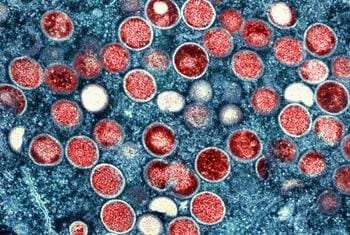The Africa Centres for Disease Control and Prevention (Africa CDC), says governments and donors have committed around one billion dollars to tackle Africa’s ongoing mpox outbreak, with the United States pledging five million dollars.
Dr Jean Kaseya, Director-General, Africa CDC, who said this during a media briefing on Friday, highlighted the critical need for improved monitoring and knowledge about the virus’s transmission.
Kaseya said that the continent’s response faces significant hurdles due to poor surveillance, insufficient testing, and limited contact tracing.
He said that less than four per cent of contacts were being traced, complicating efforts to curb the spread.
“Africa CDC and the World Health Organization (WHO) are coordinating the continental response, with plans to meet U.S Health Secretary, Xavier Becerra, to discuss how the pledged U.S. funds will be allocated.
“According to the White House, the funds will support essential areas such as training frontline health workers, and strengthening disease surveillance.
“It will also help in improviding laboratory diagnostic supplies, clinical case management, risk communication, and research,” he said.
He said that alongside the financial pledges, vaccine donations have reached 4.3 million doses, with Japan committing three million doses to the Democratic Republic of Congo (DRC), the epicenter of the outbreak.
He said that the U.S also pledged one million doses this week, adding that despite these donations, vaccine distribution remains slow, with only a fraction arriving on the continent.
He added that the DRC planned to roll out vaccinations soon, but logistical challenges, including poor infrastructure and ongoing armed conflict, were anticipated to hinder the effort.
He raised concerns about the potential for cross-border transmission, particularly through truck drivers, who played a significant role in spreading HIV across the continent.
“Uganda, which has reported 212 suspected Mpox cases, is seen as a key area of concern due to the high volume of cross-border movement with neighboring countries.
“Tanzania’s lack of reported cases also raises questions, but the country may not be Mpox-free given its proximity to affected regions,” he said.
He called for an increase in community health workers to bolster surveillance, with plans to deploy 40,000 community networkers in the DRC.
According to Kaseya, international focus on Mpox Clade II, prevalent in Europe and the U.S, has left Clade I, common in Africa, under-researched.
He said that Clade I has since mutated into the more infectious and deadly Clade Ib, for which there is no rapid diagnostic test.
“We do not have a full understanding of the epidemiology of Mpox and the transmission dynamics, there is an urgent need to address research gaps.
“Immediate priorities are enhanced surveillance, contact tracing, and laboratory testing.
“However, only half of suspected cases are being tested, with approximately 40 per cent returning positive results, a figure complicated by poor specimen quality and limited training of health personnel,” he said.
Dr Ngashi Ngongo, Africa CDC’s Chief of Staff, said that priority groups for vaccination included healthcare workers, close contacts of confirmed cases, and key populations.
Ngongo listed such closed populations to include commercial sex workers, men who have sex with men, children, and those with weakened immune systems, including individuals living with HIV.
He said that many cases were not being linked to others due to weak contact tracing, with health workers only managing to trace around three per cent of contacts.
He said that community health workers had not been fully integrated into the response, further weakening the ability to track the virus’s spread.
About 15 African countries have reported Mpox cases this year, with an additional 15 countries considered vulnerable.
Over the past week, 2,910 new cases have been reported, out of which only 436 have been confirmed due to inadequate laboratory capacity.
Since the start of the year, more than 32,000 suspected cases have been reported, yet fewer than one-fifth have been confirmed
This underscores significant weaknesses in surveillance and testing infrastructure.
While Mpox has been endemic to Central and West Africa for decades, this year’s outbreak has raised concerns.
This is because of the apparent spread of clade Ib through all types of sexual and close physical contact, leading to the infection and death of hundreds of children.
























